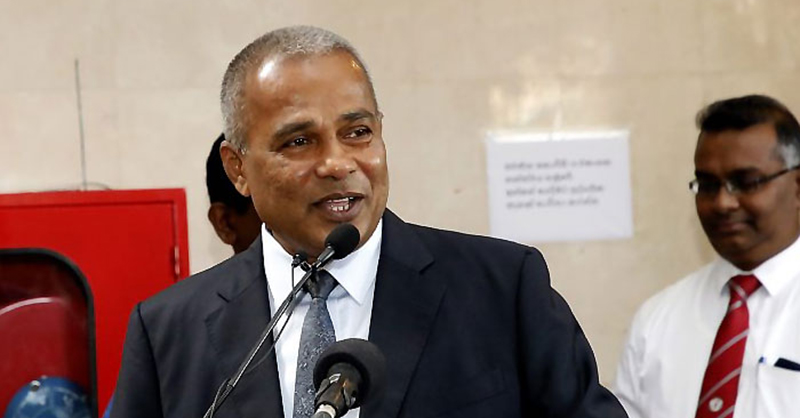Ceylon Petroleum Corporation (CPC) Chairman Sumith Wijesinghe last morning (30) appealed to the public not to wait in queues near fuel stations as they had no capacity to supply sufficient stocks of diesel to fuel stations yesterday and today (31).
Addressing a media briefing held at the Presidential Media Centre yesterday, he said: “I urge the public not to wait in queues at fuel stations, as we are not able to meet the demand for diesel for these two days. However, with the receipt of the Indian credit line in April, we expect stocks of fuel to be available in the country without any shortage.”
He also commented on the huge increase in the cost of fuel imports due to the recent rise in fuel prices in the world market. “By 2020, we had to spend a limited amount of money on fuel imports, and in 2021, about $ 2.5 billion was spent on fuel imports. However, in the three months of January, February, and March 2022 alone, between $ 1.1 and 1.2 billion had to be spent on fuel imports. If we are going to face the same situation for the rest of the year, we will have to spend more than $ 5 billion on fuel imports.”
Commenting on the fuel prices in the world market, Wijesinghe said that while the price of a barrel of fuel was around $ 87 by January 2022, by February, it had risen to $ 110. By 12 March, it had risen to $ 176, he said, adding that the current price of a barrel of fuel is $ 144.
“Last year, we spent only about $ 24-27 million to buy a fuel tanker, but now we have to spend $ 45-55 million for it. We had to work hard to manage this situation. However, we were able to manage the situation with the co-operation of all the institutions, including the Energy Ministry, the Finance Ministry, the banks, the Central Bank of Sri Lanka (CBSL), and the Presidential Secretariat.”
Meanwhile, he said that the fuel consumption in the country has increased abnormally from 2021 to date. “Diesel consumption in January 2021, was 139,000 metric tonnes (MT). By January 2022, it had increased to 198,000 MT. Diesel consumption in March was 201,500 MT. If fuel can be supplied without a shortage, this amount will increase to 225,000 MT by the end of March. This is an abnormal consumption and is 30-35% higher than in previous years.”
He added that despite the Government having restricted the importation of vehicles with the Covid-19 pandemic, a significant increase in fuel consumption in this manner should be looked into.
Meanwhile, addressing a media briefing on Tuesday (29), Energy Minister Gamini Lokuge stated that while 8,000-9,000 MT of fuel are being distributed to fuel stations daily at present, which is 1,000-2,000 MT more than the average daily fuel stocks released to fuel stations prior to the shortages, the fuel runs out at stations due to people purchasing fuel in large quantities.
He said: “In the past, an average of about 7,000 MT of fuel was distributed to fuel stations, but now 8,000-9,000 MT of fuel are being released. However, that amount is not enough, as people buy fuel in large quantities. People are carrying fuel in cans and stockpiling fuel these days. We have not imposed restrictions on fuel sales.”
He further said that a fuel bowser, which is usually sent to a fuel station, was enough for two or three days in the past, but that these days, a fuel bowser is only enough for a few hours. Responding to a question on the stock of fuel distributed to fuel stations, he added that one bowser of diesel, petrol, and kerosene each were sent to every fuel station last week.
The country has been hit by a fuel crisis over the past few months, with the economy being hit hard due to the serious deficit of US dollar (USD) reserves needed for imports. Over the last few months, many arrivals of stocks of fuel have been delayed due to the said USD shortage. As a result, the country is facing a shortage of fuel – particularly diesel – these days, and people are seen waiting in long queues near fuel stations.


